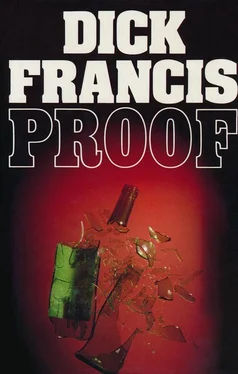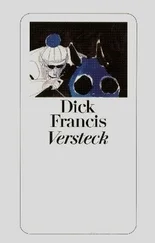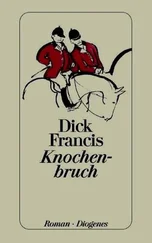‘Yes. How do you know?’
‘A man at the racecourse... the deputy clerk of the course who is present there on Saturdays and Sundays while the gates and doors are unlocked... he told our men that a Mr Beach had been to the caterer’s section yesterday and again today with a Mr McGregor.’
‘What happened?’ I asked.
‘Paul Young hasn’t gone there, Mr Beach.’ He spoke partly regretfully, partly with faint reproof.
‘Has anyone?’ I asked.
‘A man called Lew Smith arrived a short while ago in a van from Vintners Incorporated. Our men surrounded him, accompanied by the deputy clerk of the course. Lew Smith could give no good reason for being there, but neither was he Paul Young. There seemed to be no grounds for detaining him on the basis of an anonymous telephone call, and our men let him go. And now Mr Beach, could you give me an explanation? Why did you expect Paul Young to go to Martineau Park?’
‘Mr Wilson,’ I said. ‘I do know where Paul Young is now. Do you want him?’
‘Don’t be facetious, Mr Beach.’
I told him exactly where to find his quarry. I said, ‘You’ll find a printing press if you go upstairs, complete with Bell’s labels and also the same fake wine labels found in the Silver Moondance. You’ll find stolen whisky in the vats... if you apply to Rannoch whisky distillers you’ll get a profile match. The scotch was stolen from tankers belonging to a firm called Charter Carriers... you’ll find another branch of the police investigating those thefts. You’ll find plaster of Paris in Paul Young’s office... and he’s Larry Trent’s half-brother and his name is Stewart Naylor.’
‘Mr Beach...’
‘Goodbye, Mr Wilson,’ I said. ‘Please don’t waste time. Lew Smith might drive there and free him. And oh, yes, you remember Gerard McGregor and I were shot at by the robbers outside my shop? You’ll find one of those thieves tied up with Naylor. Also his gun’s there. I think his name’s Denny. Lew Smith was probably his partner. Worth a try, anyway.’
I put the receiver down although I could hear him still talking and got back into the car with Gerard.
‘There will be endless questions,’ he said.
‘Can’t be helped.’
I restarted the engine and we angled our way sedately out of Ealing, crossed the hinterland, made it safely back to the high road home.
Neither of us talked again for a long way. There was none of the euphoria of the Sunday before with the pellets burning in our bodies and our spirits high with escape. Today had been grimmer, dark with real horror, dark as wine.
Gerard shifted in his seat and sighed and said eventually, ‘I’m glad you were with me.’
‘Mm.’
Five minutes later he said, ‘I was afraid.’
‘Yes, I know. Well, so was I.’
He turned his head, glanced finally at my face and then looked forward again through the windscreen.
‘That plaster...’ He shuddered. ‘I was screaming... I’ve never been so craven in my life.’
‘Fear in a fearful situation is normal. Absence of fear is not.’
He swallowed. ‘I also feared you wouldn’t rescue me.’
‘Wouldn’t? Do you mean couldn’t, or wouldn’t try?’
‘Couldn’t, of course.’ He seemed surprised at the question. ‘It would have been pointless to do anything useless like throwing your life away to make a gesture.’
‘Die in the attempt?’
‘Dying in the attempt,’ he said sombrely, ‘has always seemed to me the height of incompetence.’
‘Or plain bad luck.’
‘All right,’ he said. ‘I’ll allow bad luck.’
Another silence lengthened. We turned off the motorway and would soon be back where we’d left my car.
‘Are you all right to drive home?’ I said.
‘Yes, perfectly.’
He looked no better than when we’d set off, but not worse either. Still grey, still strained, but still also with apparently endless reserves of stamina.
I had known him for two weeks. Fifteen days, to be accurate, since we had made tunnels under the tent at Flora’s party. With him and through him I had looked newly into many internal mirrors and was coming to understand what I saw there. I owed him a great deal and didn’t know how to tell him.
I stopped his car beside mine. We both got out. We stood looking at each other, almost awkwardly. After such intensity there seemed to be no suitable farewell.
‘I’m in your debt,’ he said.
I shook my head. ‘Other way round.’
He smiled faintly, ruefully. ‘Call it quits.’
He stepped quietly into his wine-stained car, gave me the briefest of waves, drove away.
I watched him go until he was out of sight. Then in similar peace I unlocked my own door and motored ordinarily home.
The sun was breaking through clouds when I reached the cottage, shining with the heavy golden slant of a late October tea-time.
I went into the hall and looked into the real mirror there. My hair was spiky and sticky with wine. The stains all over my head and face had dried to purple, but in the sun’s rays they still seemed to glow red. My eyes shone pale grey in a burnished landscape.
I smiled. My teeth gleamed. I looked like a red devil, I thought. A bloody red devil from the far side of terror.
I was filled quite suddenly with a sort of restless exultation.
I went through my sun-filled house shouting aloud, ‘Emma... Emma... Emma... Emma...’ and my voice bounced off the walls, reverberating.
I didn’t shout for lack of her but from wanting to tell her... wanting to shout to her to make her hear... that for once I felt I had done what I should, that I hadn’t been for ever a coward, that I knew I hadn’t failed her memory... or myself... or anything I thought I ought to be... and that I felt comforted and whole and at one with her, and that if I wept for her from now on it would be for what she had missed... the whole of life... the unborn child... and not for my own loss, not from loneliness... not from guilt.
Fragments of information floated my way for days like debris from a shipwreck.
Chief Superintendent Wilson came to tell me the police had had to saw through the crate and transport Naylor and Denny to a hospital to get their unorthodox handcuffs removed. He seemed deeply amused and also content, and took away a bottle of wine for dinner.
Sergeant Ridger returned with a cut forehead from his scuffle with the pickets and told me that the racecourse bars at Martineau Park had been on the police list of whisky complaints. He said we would have gone there on the next raceday and our pub crawl would have been successful: and I didn’t like to tell him that it already had been, thanks to Mrs Alexis.
Mrs Alexis asked me to lunch. I went, laughed a lot, and came away with a commission to choose and supply wine for her restaurant. Wilfred had survived the soot and the sweep got the sack.
Gerard fed me with constant news, mostly good.
The scotch in the big storage tanks had been profile-matched and had proved to be the third load stolen from the tanker. The Martineau Park and Silver Moondance scotch was all from the second load. The first load had presumably been sold and drunk.
Rannoch’s were refusing to collect or accept their scotch because of the tap water. Customs and Excise were pressing all and sundry for the duty. Kenneth Charter’s insurers were insisting that as the whisky was Rannoch’s, Rannoch’s should pay. Rannoch’s said Naylor should pay. Kenneth Charter’s suggestion that they run the stuff away down a drain and forget it was not being treated seriously.
The best news was that the insurers had agreed to reinstate Charter’s policies in full: the tanker fleet would stay in business.
Kenneth Junior’s part was so far unknown to the police and would with luck remain so. Kenneth Junior wrote to his father from Australia asking for more money, which Kenneth Senior sent him along with advice to stay far away until parental disgust had abated.
Читать дальше












